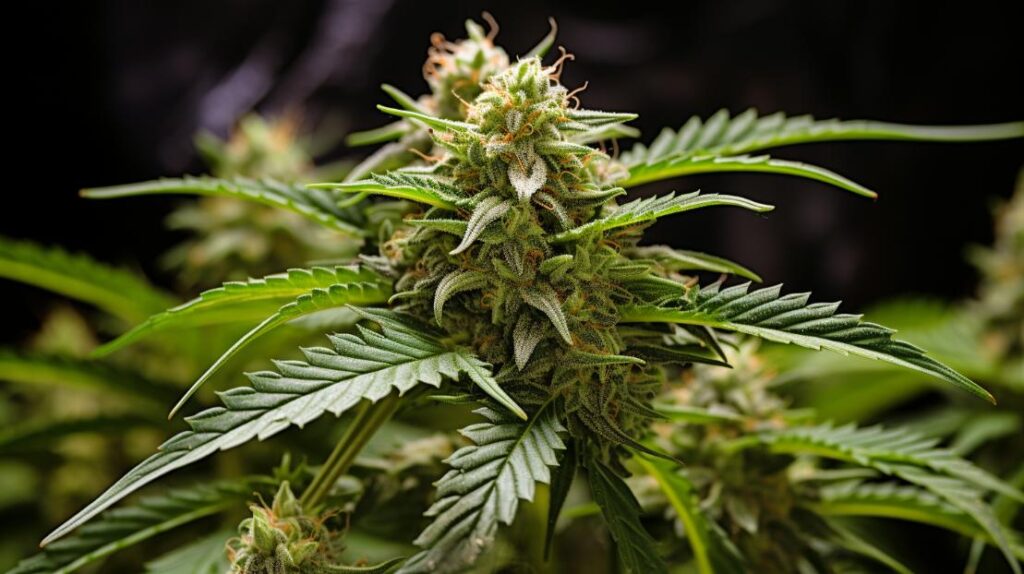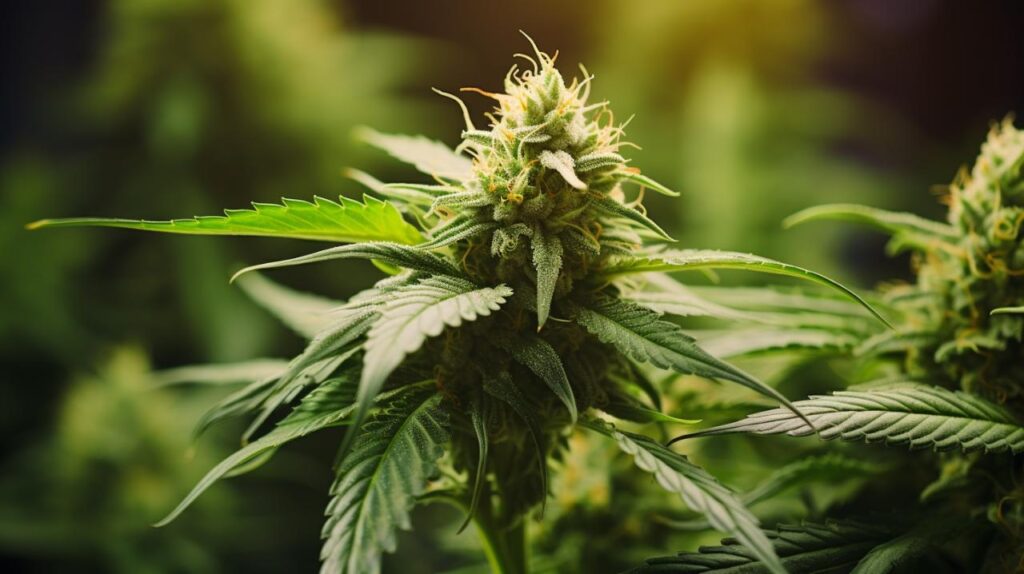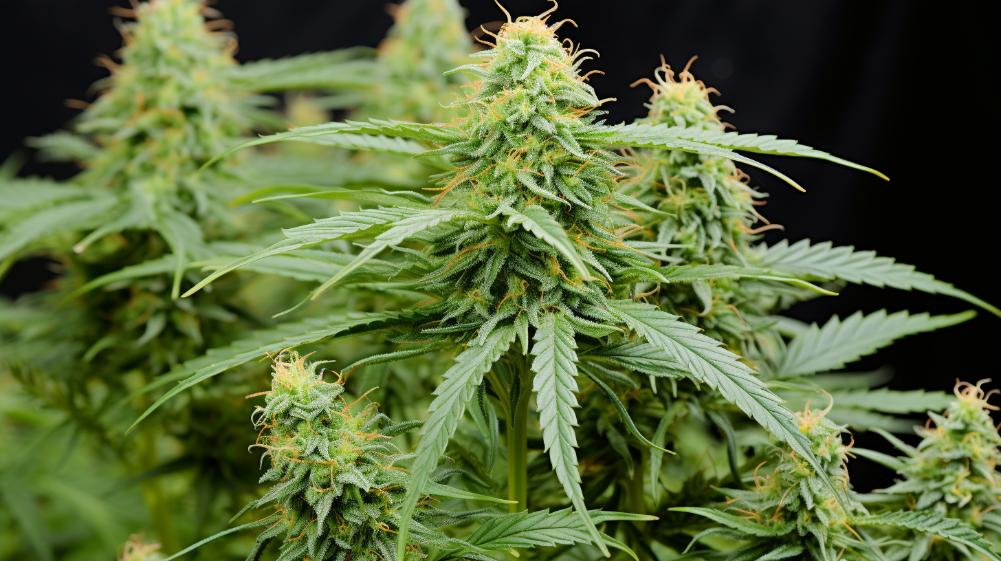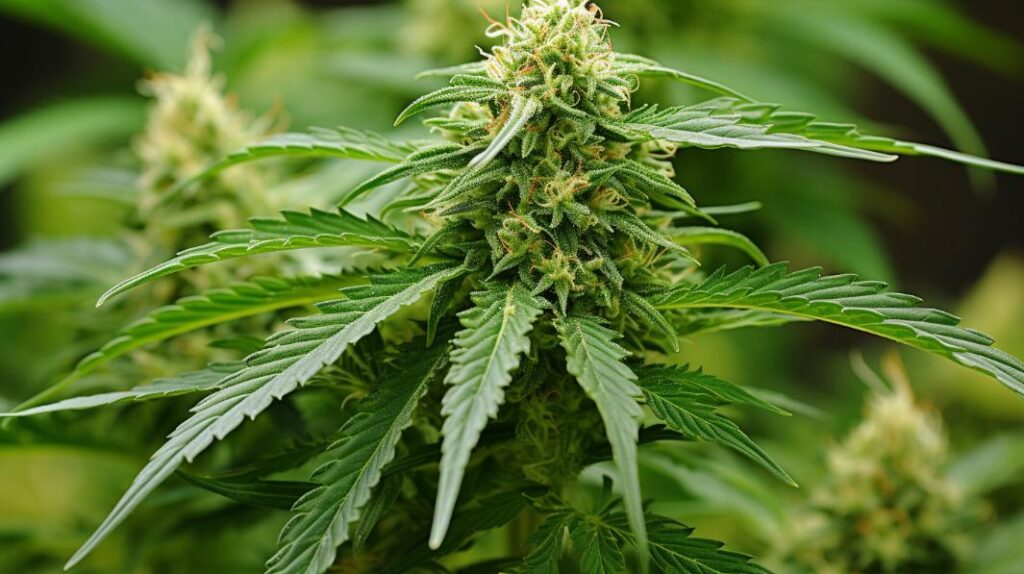Lemon Kush (aka Cali Lemon Kush)

The enigmatic Lemon Kush strain, a purported crossbreed between contrasting sativa and indica genetics, stands as a subject of intrigue within the cannabis community. Its precise lineage remains shrouded in ambiguity, with various cultivators claiming differing parent strains, yet it consistently exhibits distinctive traits such as its invigorating lemon scent and a complex profile of cannabinoids and terpenes.
As aficionados appreciate its harmonious blend of mental stimulation and physical relaxation, the strain’s versatility in addressing a spectrum of ailments cannot be overstated. However, the conversation surrounding Lemon Kush extends beyond its therapeutic applications, touching upon its cultivation challenges, the nuances of its sensory experience, and the implications of its use in a broader societal context.
In exploring the multifaceted nature of Lemon Kush, one cannot help but ponder the implications of its genetic mystery and the potential that such a strain holds for both connoisseurs and the medical community.
Genetic Lineage
The genetic lineage of Lemon Kush is a subject of considerable debate among cannabis enthusiasts, with various sources attributing its parentage to different combinations of Kush and Lemon strains, each contributing distinct characteristics to its profile. While commonly believed to be a cross between Master Kush and Lemon Joy, this hybrid strain’s exact origins remain shrouded in mystery due to the variations in breeder reports and the clandestine nature of cannabis genetics.
Analyzing the differing claims, one finds a near consensus on the strain’s balanced nature, indicative of a nearly 50-50 split between indica and sativa influences. This composition suggests a deliberate amalgamation aimed at capturing the earthy robustness of mountain Kush varieties with the invigorating zest of a lemon sativa.
In contrast, some cannabis aficionados argue for a genetic makeup consisting of Afghan Kush and Lemon G, a pairing that ostensibly imparts the sweet lemon and citrus flavors with an undercurrent of earthy Kush tones.
Such discrepancies in the accounts of Lemon Kush’s lineage underscore the complexity of cannabis genetics and the influence of individual breeders on strain characteristics. As a result, those seeking to understand or experience Lemon Kush should consider the varied perspectives on its genetic origins.
THC/CBD Content
Lemon Kush’s THC content varies significantly, ranging from a moderate 15% to a robust 26%, marking it as a strain with considerable psychoactive potential. As a well-balanced hybrid, Lemon Kush appeals to users seeking a blend of cerebral and physical effects that are potent yet not overwhelming, contingent on the THC level present in the specific batch. This variation in THC content underscores the importance of users knowing their own tolerance levels and the potency of their particular Lemon Kush specimen.
Here is a breakdown of Lemon Kush’s cannabinoid content:
-
THC Content: Typically around 20%, with some phenotypes reaching up to 26%. This high THC content is responsible for the strain’s powerful euphoric and mood-enhancing effects.
-
CBD Content: Notably low or negligible, often less than 1%. Lemon Kush’s therapeutic effects are predominantly derived from its THC rather than CBD.
-
THC to CBD Ratio: Heavily skewed towards THC, with ratios that can exceed 20:1, emphasizing the strain’s psychoactive focus.
The thc/cbd content profile of Lemon Kush makes it more suitable for recreational use or for medical patients who benefit from high THC strains. Consumers seeking a CBD-rich strain for its non-psychoactive, medicinal benefits might find Lemon Kush lacking in this regard.
Terpene Profile
While the cannabinoid content of Lemon Kush is a key factor in its effects, the strain’s distinctive terpene profile also plays a crucial role in shaping its aromatic essence and potential therapeutic benefits. The lemon scent, often associated with Lemon Kush, is largely attributed to its high limonene content, a terpene renowned for its citrusy aroma. This primary terpene is not just influential in terms of fragrance; limonene also has been associated with potential anti-inflammatory and anti-carcinogenic properties, which may contribute to the therapeutic efficacy of this strain.
The terpene profile of Lemon Kush extends beyond limonene, encompassing a variety of other terpenes that complement its effects and aroma. Here’s a breakdown of the main terpenes found in Lemon Kush:
| Terpene | Aroma Contribution | Potential Benefits |
|---|---|---|
| Limonene | Citrusy, lemon scent | Anti-inflammatory, Anti-carcinogenic |
| Beta Caryophyllene | Spicy, peppery | Gastro-protective, Anti-inflammatory |
| Alpha Humulene | Woody, earthy | Anti-inflammatory, Appetite Suppressant |
The combination of these terpenes not only defines the unique aroma and taste profile of Lemon Kush but also underscores the importance of considering the terpene lab data when assessing the strain’s full spectrum of effects and potential medicinal properties. Understanding the intricacies of the terpene profile allows for a more analytical and informed approach to its use.
Effects
Users of Lemon Kush often report a harmonious blend of cerebral stimulation and physical relaxation, leading to a state of uplifted contentment and euphoria. This sense of well-being is typically accompanied by a noticeable increase in happiness and bouts of giggles, making it a popular choice for social settings or creative endeavors. The strain’s balanced hybrid nature, with its high THC potency, is a key contributor to the range of effects experienced by users.
The consumption of Lemon Kush, however, is not without its drawbacks. Some of the notable side effects include:
- Dry mouth, commonly referred to as ‘cottonmouth,’ which is a frequent byproduct of cannabis use.
- Dry eyes, another typical reaction that may require the use of eye drops for relief.
- A less common but significant side effect is the potential for feelings of paranoia, especially in those who are new to cannabis or consume higher doses.
Moreover, Lemon Kush’s calming effects extend to the medical domain, where it aids in alleviating symptoms associated with stress, anxiety, and depression. Visually, the strain’s buds may exhibit a white frosting of trichomes, hinting at the potency that lies within and the robust effects that await consumers.
Medical Uses
Many individuals turn to the Lemon Kush strain for its potential therapeutic benefits, particularly in the management of stress, anxiety, and chronic pain. User reviews often highlight Lemon Kush’s efficacy in alleviating mental health concerns, such as depression, by inducing a sense of relaxation and a mellowing body buzz. The potency of this strain, with a THC content ranging from 15% to 26%, suggests that it may offer significant relief for various ailments. However, the strong psychoactive effects warrant caution and underscore the importance of consulting healthcare professionals before using Lemon Kush as a treatment.
The therapeutic potential of Lemon Kush is also linked to its terpene profile. High levels of Limonene, a terpene known for its uplifting and mood-enhancing effects, may account for the strain’s reported success in reducing anxiety. Additionally, Limonene’s anti-inflammatory and anti-carcinogenic properties may broaden the medical applications of Lemon Kush. Despite these potential benefits, users must be aware of the possibility of adverse effects and the variations in individual responses to cannabis.
Medical use of the Lemon Kush strain should be approached with careful consideration and professional guidance.
Flavor and Aroma
Beyond its potential therapeutic applications, the Lemon Kush strain is also renowned for its invigorating sensory profile, characterized by a fresh lemon fragrance and sweet citrus smoke that entice the palate and olfactory senses. This strain’s allure is not only in its effects but also in the rich and vibrant flavors that it offers, which can be attributed to its specific terpene profile.
The aromatic experience of Lemon Kush is a complex symphony of scents and tastes that can be broken down into the following components:
-
Primary Scent and Taste: Lemon Kush is predominantly noted for its sweet lemon aroma, which is often the first impression noted by consumers. The presence of the terpene limonene imparts a burst of lemon flavor, creating a refreshing and tangy smoke.
-
Citrusy Notes: Accompanying the sweet lemon core is a broader spectrum of citrus notes, adding layers of depth to the lemon flavor and enhancing the overall sensory experience.
-
Earthy Undertones: Despite the dominance of citrus elements, there is a subtle blend of earthy undertones that ground the flavor profile, reflecting the Kush lineage of the strain.
The balance between the sweet lemon and earthy Kush traits results in a distinctive and enjoyable taste that is highly appreciated by cannabis connoisseurs. The flavor and aroma of Lemon Kush are key contributors to its popularity and are indicative of the quality and care taken in its cultivation and production.
Appearance
The Lemon Kush strain presents itself with visually striking buds, characterized by their dense, nugget-like structure and a vibrant light green hue blanketed with a heavy dusting of trichomes. These light green buds are not only a testament to the strain’s aesthetic appeal but also indicative of its potency. The trichomes contribute to the sticky texture of the buds, often seen as a quality marker among cannabis connoisseurs.
Analyzing the plant’s morphology, Lemon Kush typically reaches a height of 4 to 6 feet when grown indoors, assuming a bushy indica profile that is both robust and visually impressive. This growth pattern is typical for Kush varieties, with Lemon Kush exemplifying the archetype with its resinous and compact buds.
The cultivation process plays a significant role in the final appearance of the Lemon Kush buds. Organic cultivation methods, along with proper curing techniques, are crucial in enhancing both the visual appeal and the intrinsic quality of the buds. Such practices ensure that the light green buds retain their vivid coloration and trichome coverage, making Lemon Kush a visually appealing choice for both seasoned smokers and newcomers to the cannabis scene.
Grow Information
For cultivators seeking a balance between ease and quality, Lemon Kush presents an advantageous growth profile, with its medium stature and propensity for branching responding well to attentive training and pruning practices. This marijuana strain thrives when its robust branching is guided, allowing for improved light exposure and air circulation, which are crucial for the development of dense, resinous buds.
Cultivation of Lemon Kush can be optimized by considering the following factors:
-
Flowering Time: Lemon Kush typically requires an 8-10 week flowering period. Monitoring the maturation process closely ensures that the plants are harvested at the peak of their THC production.
-
Climate Compatibility: This strain performs best in hot and dry climates, resembling its Kush lineage’s origins. Growers in southern regions often find that Lemon Kush adapts well to the environmental conditions, making outdoor cultivation a viable option.
-
Organic Cultivation: To maximize the potential of Lemon Kush, it is recommended to employ organic growing techniques. Organic cultivation not only supports the development of the strain’s distinctive lemony aroma and flavor but also contributes to the overall potency, with a THC content that can reach up to 26%.
Cloning is a practical approach to propagating Lemon Kush, ensuring the consistency of the strain’s desirable characteristics. When grown with care, Lemon Kush can yield high-quality, potent buds that live up to the reputation of the Kush family.
Adverse Effects
While Lemon Kush is celebrated for its ease of cultivation and potent effects, it is not without potential adverse reactions, such as dry mouth and dry eyes, that users should be mindful of. These symptoms are often reported as mild but can detract from the overall experience if not anticipated and managed. Dry mouth, also known as cottonmouth, is a ubiquitous side effect associated with cannabis use, and Lemon Kush is no exception. Hydration can mitigate this discomfort, emphasizing the importance of water intake before, during, and after consumption.
In terms of more acute adverse effects, improper consumption of Lemon Kush may lead to sensations of paranoia or dizziness. These effects underscore the necessity for moderation, particularly for users with lower tolerance levels or those new to cannabis. The experience of dry eyes is another common inconvenience, which can be alleviated with the use of over-the-counter eye drops.
It is crucial to acknowledge that the adverse effects of Lemon Kush can vary from person to person, with some individuals more susceptible to certain reactions than others. Responsible consumption of Lemon Kush, with attention to personal limits and conditions, is paramount in minimizing the risk of adverse effects and ensuring a pleasant experience with the strain.
Comparisons with Similar Strains
Exploring the diverse landscape of hybrid cannabis strains reveals that Lemon Kush distinguishes itself with a harmonious blend of invigorating sativa-driven euphoria and relaxing indica effects, a duality echoed in similar strains yet uniquely characterized by its citrus-infused aroma and flavor profile. This strain, with its bright notes and underlying Kush lineage, offers a distinctive experience in the hybrid category.
When comparing Lemon Kush to similar strains, several key points stand out:
-
Taste and Aroma: Its vibrant lemon and citrus flavors, underpinned by the earthiness of Kush strains, mark a stark contrast to other hybrids that may share its effects but offer different olfactory experiences. For example, Lemon G, another citrus-centric strain, provides a comparably zesty taste but with a different terpene profile.
-
Potency: With an average THC level of 26%, Lemon Kush is on par with some of the most potent strains available, like Afghan Kush, which is known for its high THC content and deeply sedative effects.
-
Effects: While it shares stress-relieving and mood-enhancing properties with many hybrids, Lemon Kush leans towards a more energizing and creative high, which is less common in the typically more sedating Kush family, including the classic Afghan Kush.
Analyzing these attributes, it’s evident that Lemon Kush offers a unique combination of flavor, potency, and effects within the hybrid strain spectrum.
Research and Studies
Recent studies on the Lemon Kush cannabis strain have highlighted its potential therapeutic effects, particularly in the relief of stress, anxiety, and depression among users. The presence of the terpene limonene, which is prominent in Lemon Kush, may contribute to these soothing effects. Furthermore, limonene has been studied for its potential anti-inflammatory and anti-carcinogenic properties, which could add to the therapeutic profile of the Kush strain.
The high THC content of Lemon Kush, which ranges from 15% to 26%, accounts for its potency and reinforces the importance of dosage management, especially for those new to cannabis use. User reviews and lab data act as complementary sources of information, providing insights into the strain’s effects and assisting consumers in making informed decisions.
The complex genetic lineage of Lemon Kush, with its debated parent strains, adds to the intrigue surrounding the strain’s origins and potential variability in its effects. The table below summarizes key research aspects of Lemon Kush:
| Aspect | Detail | Relevance |
|---|---|---|
| Therapeutic Effects | Stress, anxiety, depression relief | Mental Health Applications |
| Terpene Profile | High limonene content | Potential Health Benefits |
| THC Content | 15% – 26% | Potency and Dosage |
| Genetic Lineage | Debated parent strains | Variability in Effects |
This analytical approach provides a foundation for understanding Lemon Kush’s potential benefits and encourages further research into its applications.
History and Origin
Tracing its roots to a crossbreed by Alien Genetics, Lemon Kush emerges from the union of Lemon G (also known as Lemon G13) and a pure landrace Afghani Kush, contributing to its notable lemony scent and robust genetic profile. This strain’s history and development are marked by a few key points:
-
The parentage of Lemon Kush is often debated, with some sources crediting a mix of Afghan Kush and Lemon G, while others suggest a blend of Master Kush and Lemon Joy.
-
The presence of Limonene, a citrus-scented terpene, is responsible for Lemon Kush’s distinctive lemony aroma and is also associated with mood-enhancing properties.
-
The strain’s THC content is variable, with potential levels ranging from a moderate 15% to a potent 26%, and some lab tests reporting as high as 24.93%.
While Lemon Kush has gained popularity for its unique flavor profile and potent effects, it is essential to approach its consumption with caution. Due to the strain’s strength, responsible usage is advised to mitigate the risk of adverse effects such as dry mouth, paranoia, or dizziness.
Understanding the history and origin of Lemon Kush by Alien Genetics provides cannabis enthusiasts with an appreciation for its complex lineage and the careful cultivation that has led to its current status in the cannabis community.
Frequently Asked Questions
Is Lemon Kush a Sativa or Indica?
Lemon Kush exhibits a balance of traits that reflect its diverse genetics. It combines the cerebral effects of sativa with the physical relaxation of indica, revealing a nuanced interplay of Kush characteristics and Lemon genetics.
What Is Lemon OG Kush Good For?
Lemon OG Kush, characterized by its citrus terpenes, is reported to offer medicinal benefits, including stress relief and pain management, according to patient anecdotes and limited scientific research on cannabinoid therapy.
Is Lemon Weed Good?
The current inquiry pertains to the efficacy of lemon-flavored cannabis. Its medicinal potential lies in its terpene profile, which may offer therapeutic benefits, including stress relief and mood enhancement.
What Strain Is Super Lemon Kush?
Super Lemon Kush is a cannabis variety bred for its citrus genetics, embodying advanced cultivation techniques to yield its distinctive lemon profile and sought-after psychoactive and therapeutic effects.







Responses